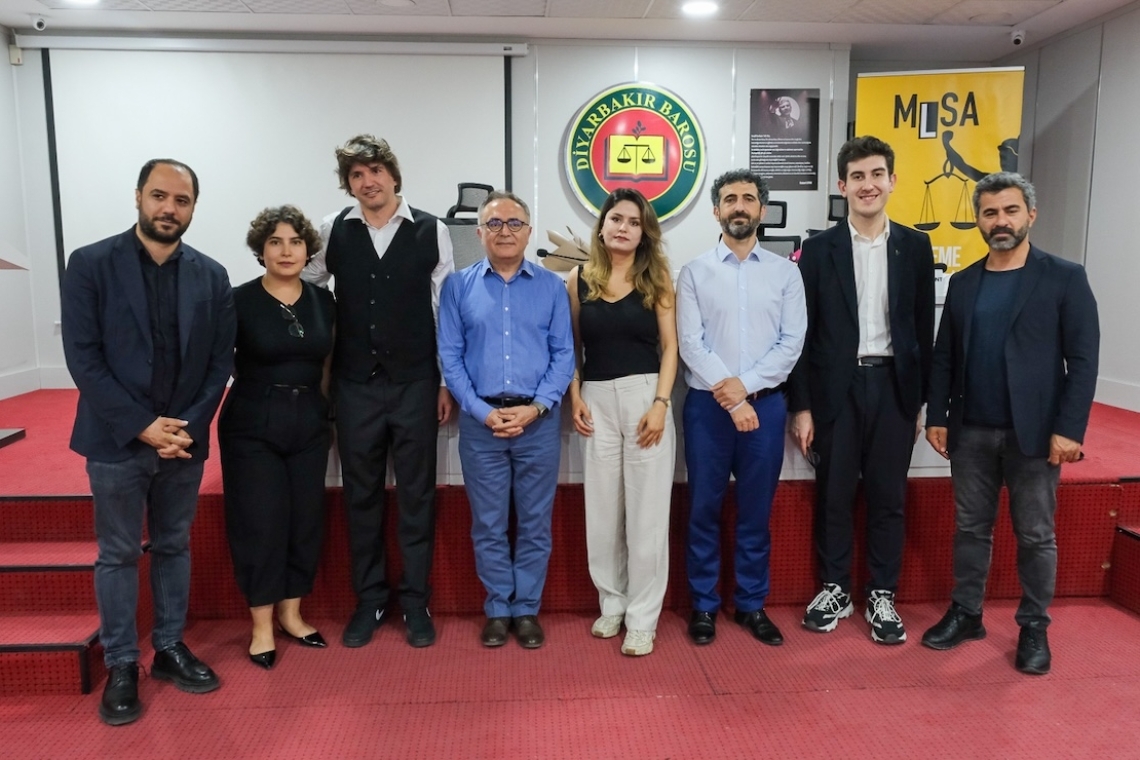The Media and Law Studies Association (MLSA), in collaboration with the Diyarbakır Bar Association, organized a workshop titled “Individual Application to the European Court of Human Rights (ECHR).” The workshop featured former ECHR judge Dr. Rıza Türmen, Head of the ECHR Turkey Desk Dr. Atilla Nalbant, Levent Yalçın from the ECHR Turkey Desk, and Assoc. Dr. Ümit Kılınç from the Strasbourg Bar Association. They shared insights on the ECHR’s regulations, current practices, and the admissibility of individual applications.
Held on May 11 at the Diyarbakır Bar Association Tahir Elçi Conference Hall, the workshop was attended by MLSA Co-Director Veysel Ok, Deputy Chairman of the Diyarbakır Bar Association Mehdi Özdemir, CHP Diyarbakır MP Sezgin Tanrıkulu, and numerous lawyers.
ECHR registry is here, says Veysel Ok
In his opening speech, MLSA Co-Director Veysel Ok noted that this was the third ECHR workshop they had organized for lawyers in Diyarbakır. He emphasized the importance of the presence of key ECHR figures, stating, “The ECHR registry is here. Levent Yalçın, Dr. Atilla Nalbant, Assoc. Dr. Ümit Kılınç, and former ECHR judge Dr. Rıza Türmen are here. The applications you make to the ECHR come here first. Therefore, this is the place to address your errors or questions. We hope the training is fruitful. We thank both our guest from France and the Diyarbakır Bar Association.”
Individual applications to ECHR crucial, says Özdemir
Deputy Chairman Mehdi Özdemir highlighted the significance of individual applications to the ECHR amid intense human rights violations. He stated, “These applications are crucial for our profession, our advocacy activities, and our legal struggle. ECHR decisions are important for addressing the outcomes of human rights violations in Turkey, Diyarbakır, and the region, and for preventing future violations. I thank MLSA and our scholars for this workshop.”
Knowledge of ECHR applications essential, says Tanrıkulu
CHP MP Sezgin Tanrıkulu stressed the importance of knowing how to apply to the ECHR and the Constitutional Court for the legal profession. He recalled the lack of resources on how to apply to the ECHR in 1987 and praised the Diyarbakır Bar Association and the Human Rights Association (IHD) Diyarbakır Branch for pioneering ECHR applications in Turkey. He noted that these applications exposed the ECHR to unprecedented rights violations and contributed to its dynamic structure.
Implementation of ECHR decisions is a rule of law issue, says Türmen
Former ECHR judge Dr. Rıza Türmen, speaking via video conference, discussed the problem of implementing ECHR decisions. He emphasized, “The failure to implement ECHR decisions is the system’s weakest point. Implementation is crucial for the system’s functioning and the ECHR’s credibility and effectiveness.” He explained the procedures of the Committee of Ministers regarding the implementation of ECHR decisions and highlighted Turkey’s poor record in this area, with 458 decisions awaiting implementation, including the high-profile cases of Selahattin Demirtaş and Osman Kavala.
Administrative rejections of ECHR applications decline, says Yalçın
Levent Yalçın from the ECHR Registry detailed the application process and criteria for admissibility under Rule 47 of the ECHR Rules of Court. He provided statistics showing that the rate of administrative rejections for applications decreased from 27% in 2021 to 20% in 2024. He also addressed changes to the ECHR application form effective March 28, 2024, and offered tips to avoid common errors in applications.
ECHR’s contributions to Turkish democracy and human rights are significant, says Kılınç
Assoc. Dr. Ümit Kılınç of the Strasbourg Bar Association underscored the ECHR’s importance for Turkey, detailing the court’s structure, functioning, and various departments. He explained the stages of the application process, the conditions for friendly settlements, and the criteria for admissibility. He also discussed the impact of ECHR violation decisions and the necessary steps to remedy these violations, including retrials and compensation.
One in three cases at ECHR is from Turkey, says Nalbant
In the final session, Dr. Atilla Nalbant of the ECHR Registry’s Turkey Desk highlighted that 35% of the 65,700 cases pending at the ECHR are from Turkey. He pointed out that the majority of these cases were filed after the failed coup attempt on July 15, 2016. Nalbant discussed the ECHR’s sensitivity to rights violations resulting from emergency decrees and the prioritization of these cases. He also provided insights into the distribution of violation types and recent procedural changes effective March 28, 2024.
The workshop concluded with a Q&A session and the presentation of flowers and plaques to the speakers by MLSA and Diyarbakır Bar Association President Nahit Eren.



